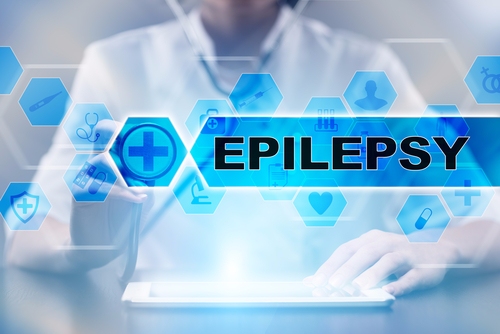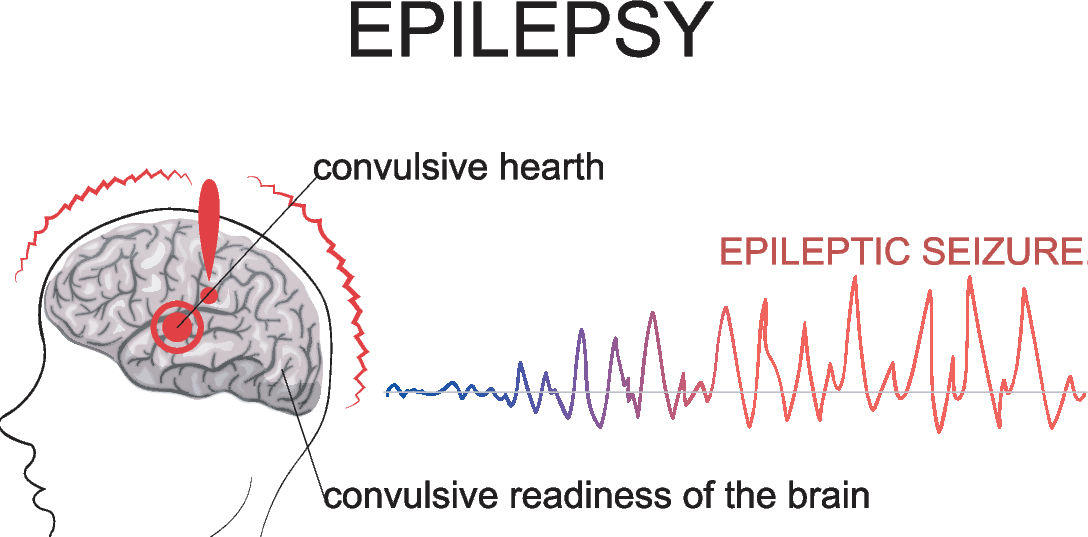On 17th November, National Epilepsy Day is commended every year by the Epilepsy Foundation, India so as to make people aware about the disease Epilepsy.
This is a condition which are characterized by recurrent, unprovoked seizures, which are abnormal, hypersynchronous discharge of cortical neurons in the brain at a rate of up to four times higher than normal causing a temporary disturbance in the messaging systems between brain cells.

How are seizures classified?
1. Generalized onset seizures: These seizures affect both sides (hemispheres) of the brain or groups of cells on both sides of the brain at the same time from the onset. They are classified into
- Absence seizures- Sometimes called petit mal seizures. Absence seizures are short, non-convulsive lapse in awareness or consciousness usually lasting a maximum of 10 seconds.
Symptoms: They cause a blank stare and a short loss of awareness. This type of seizure may also cause repetitive movements like blinking or lip-smacking and usually occur in children.
- Atonic (Drop) Seizures - Often called drop attacks, these seizures can cause facial or head injury.
Symptoms: They cause a sudden loss or decrease of normal muscle tone and the person become floppy, often collapse and falls to the ground usually forward. They usually last less than 15 seconds.
- Clonic Seizures - During a clonic seizure, a person may have sustained rhythmical jerking and lose control of bodily functions.
Symptoms: They are characterized by recurring, jerky muscle movements of the face, neck, and arms.
- Tonic Seizures - These are very rare, particularly when they occur without clonic jerking. Mostly happen during sleep and usually involve all or most of the brain, affecting both sides of the body.
Symptoms: This can also happen when the person is awake and they often fall, usually backward. Tonic seizures are short, usually less than 20 seconds.
- Tonic-Clonic Seizures- formerly called as grand mal seizure, tonic-clonic seizure is what most people think of when they think of a seizure with strong, symmetrical, rhythmic movements.
Symptoms: Tonic-clonic seizure usually lasts one to three minutes, but lasting more than 5 minutes is a medical emergency. After having a seizure, you may not remember having one, or you might feel slightly ill for a while.
- Myoclonic seizures- Myoclonic means ‘ muscle jerks’ and they are short, shock-like jerks of a muscle or a group of muscles, typically lasting no more than a second or two, which sometimes can result in a fall.
Symptoms: Spontaneous quick twitching of the arms and legs.
2. Focal onset seizures: Previously called partial seizures, the term focal is used instead of partial to be more accurate when talking about where seizures begin.
Symptoms of focal onset seizures include:
- changes in sense of taste, sight, smell, hearing, or touch
- dizziness
- tingling and twitching of limbs
- staring blankly
- unresponsiveness
- performing repetitive movements
3. Unknown onset seizures: When the beginning of a seizure is not identified/seen or the seizure cannot be diagnosed as either focal or generalized onset, it’s now called an unknown onset seizure.
Causes and risk factors:
- In many patients, the exact cause of epilepsy is not known. Some people have inherited genetic factors which make them epileptic.
- Traumatic brain injury, for instance, during a car crash and scarring on the brain after a brain injury (post-traumatic epilepsy)
- Brain conditions, including stroke, tumors, cyst etc
- Degenerative Disorders such as Dementia or Alzheimer’s disease, Phenylketonuria, Sturge-Weber syndrome, Tay-Sachs disease etc
- Infectious diseases, for instance, AIDS, meningitis, tuberculosis, viral encephalitis etc
- Maternal drug use, brain malformation, prenatal injury or lack of oxygen at birth.
- Developmental disorders such as autism, neurofibromatosis, down syndrome, cerebral palsy, and intellectual disability.
- Exposure to Lead, Carbon monoxide and other environmental toxins
- Overdose and abrupt withdrawal from some prescription drugs can result in seizure activity.
- Chronic abuse of alcohol and Alcohol withdrawal may also be associated with the development of epilepsy in some people.

Epilepsy Treatments:
The treatment will depend on their cause. The treatment for seizures due to epilepsy includes:
Pharmacotherapy: This is the first-line treatment for patients with epilepsy or seizures. The mechanism of activity of AEDs (anti-epileptic drugs) is to control the electrical activity in the brain that causes seizures. AED’s work best if they are taken regularly, around the same time each day. Up to 60%-70% of people have their seizures fully controlled with the right AEDs.
The physician will usually prescribe regular use of seizure-preventing medications to achieve a seizure-free status without adverse effects. Most Antiepileptic medicines are available in tablet, liquid, or injectable forms and the choice of drug depends on the kind of seizure a person is having.
Surgery: Your neurologist may recommend brain surgery to treat epilepsy if you have seizures that are uncontrollable by medications. Brain surgery for epilepsy is the surgical removal of seizure-producing areas of the brain. Surgery can be possible if the cause for your epilepsy can be found in a specific area of your brain and you have tried several AEDs and none of them have stopped or significantly reduced your seizures.
Diet therapy: A ketogenic diet is a first-line treatment for a few specific epilepsy syndromes, such as epilepsy due to mutations in pyruvate dehydrogenase deficiency (GLUT-1). This is also used for patients with epilepsy whose seizures are not controlled with AEDs particularly children. The diet may help to reduce the frequency or severity of seizures and also often have positive effects on behaviour. The diet can be adapted to all ethnic diets.
Epilepsy Disease Treatment in India
Dr. Sai Sudarsan is a Neurosurgeon and Neurospine Surgeon in Secunderabad, Hyderabad and has an experience of over 3 decades in his field. He practices at Star Hospitals in Banjara Hills, Hyderabad and Srikara Hospitals in Secunderabad, Hyderabad. His field of expertise are micro neurosurgery, neuroendoscopy, Spine Surgery, Epilepsy surgery,Peripheral Neuro surgery,Deep Brain Stimulation and Decompression, Micovascular spinal instrumentation, stereotaxy etc.

Mail us: This email address is being protected from spambots. You need JavaScript enabled to view it.
Book appointment: www.neurosurgerynow.com/book-appointment.html


